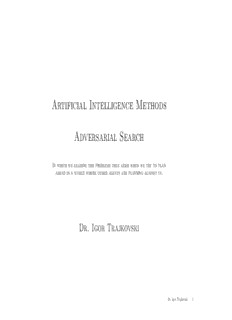
Artificial Intelligence Methods Adversarial Search - TIME.mk PDF
Preview Artificial Intelligence Methods Adversarial Search - TIME.mk
Artificial Intelligence Methods Adversarial Search In which we examine the problems that arise when we try to plan ahead in a world where other agents are planning against us. Dr. Igor Trajkovski Dr. IgorTrajkovski 1 Outline ♦ Games ♦ Perfect play – minimax decisions – α–β pruning ♦ Resource limits and approximate evaluation ♦ Games of chance ♦ Games of imperfect information Dr. IgorTrajkovski 2 Games vs. search problems “Unpredictable” opponent ⇒ solution is a strategy specifying a move for every possible opponent reply Time limits ⇒ unlikely to find goal, must approximate Plan of attack: • Computer considers possible lines of play (Babbage, 1846) • Algorithm for perfect play (Zermelo, 1912; Von Neumann, 1944) • Finite horizon, approximate evaluation (Zuse, 1945; Wiener, 1948; Shannon, 1950) • First chess program (Turing, 1951) • Machine learning to improve evaluation accuracy (Samuel, 1952–57) • Pruning to allow deeper search (McCarthy, 1956) Dr. IgorTrajkovski 3 Types of games deterministic chance perfect information chess, checkers, backgammon go, othello monopoly imperfect information battleships, bridge, poker, scrabble blind tictactoe nuclear war Dr. IgorTrajkovski 4 Game tree (2-player, deterministic, turns) MAX (X) X X X MIN (O) X X X X X X X O X O X . . . MAX (X) O X O X X O X O . . . MIN (O) X X . . . . . . . . . . . . . . . X O X X O X X O X TERMINAL O X O O X X O X X O X O O Utility −1 0 +1 Dr. IgorTrajkovski 5 Minimax Perfect play for deterministic, perfect-information games Idea: choose move to position with highest minimax value = best achievable payoff against best play E.g., 2-ply game: 3 MAX A A A 1 2 3 3 2 2 MIN A A A A A A A A A 11 12 13 21 22 23 31 32 33 3 12 8 2 4 6 14 5 2 Dr. IgorTrajkovski 6 Minimax algorithm function Minimax-Decision(state) returns an action inputs: state, current state in game return the a in Actions(state) maximizing Min-Value(Result(a,state)) function Max-Value(state) returns a utility value if Terminal-Test(state) then return Utility(state) v←−∞ for a, s in Successors(state) do v←Max(v, Min-Value(s)) return v function Min-Value(state) returns a utility value if Terminal-Test(state) then return Utility(state) v←∞ for a, s in Successors(state) do v←Min(v, Max-Value(s)) return v Dr. IgorTrajkovski 7 Properties of minimax Complete?? Dr. IgorTrajkovski 8 Properties of minimax Complete?? Only if tree is finite (chess has specific rules for this). NB a finite strategy can exist even in an infinite tree! Optimal?? Dr. IgorTrajkovski 9 Properties of minimax Complete?? Yes, if tree is finite (chess has specific rules for this) Optimal?? Yes, against an optimal opponent. Otherwise?? Time complexity?? Dr. IgorTrajkovski 10
Description: